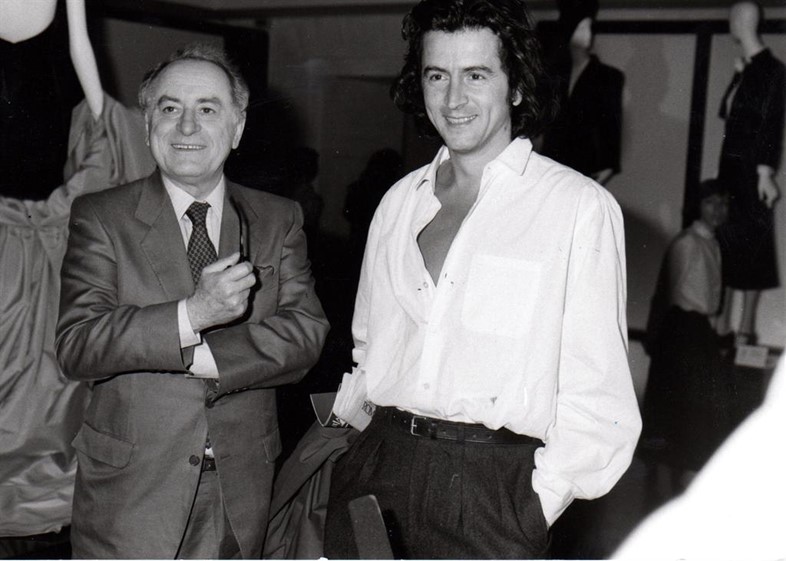French philosopher and intellectual Bernard-Henri Lévy is, most recently, the author of Left in Dark Times and, with Michel Houellebecq, of Public Enemies. In October 2010, Lévy published the twentieth anniversary issue of La Règle du Jeu, the

Organised around a regular pattern: in this column each interviewee picks the picture that illustrates their interview, answers six questions that are the same for all contributors and then two more that are designed specifically for them.
French philosopher and intellectual Bernard-Henri Lévy is, most recently, the author of Left in Dark Times and, with Michel Houellebecq, of Public Enemies. In October 2010, Lévy published the twentieth anniversary issue of La Règle du Jeu, the review that he runs, which gathered insights on the twenty years to come from some of the world’s most distinguished creative and theoretical minds, from Joyce Carol Oates to Takashi Murakami, and Zaha Hadid to Vanity Fair editor, Graydon Carter.
How would you connect fashion to elegance?
Obviously, one would like to answer, “Of course, it doesn’t have anything to do with that; fashion belongs to a certain moment; elegance is eternal”. But at the same time, it isn’t true. Nothing – and we have known this since, at least, Nietzsche and Foucault – is eternal. And that’s the reason why fashion, indeed, has something to say about elegance.
What is the role of history and art history in your conception of fashion?
Fundamental, of course. Fashion is history. Fashion is but history. The hypothesis on which fashion is based is that precisely no one escapes, or can escape, from history. Then, one should ask: is it forbidden to escape the history of merchandising; to escape the history of art; to escape both ? That is the actual question.
Would you describe fashion as a language and a discourse, as Barthes did?
Barthes and Mallarmé, yes. Especially Mallarmé, one of the greatest French poets, who, between September and October 1874, under the pseudonyms of Marguerite de Ponty, Miss Satin and Olympe la négresse, ran a review called Journal de la Dernière mode: the main idea was indeed that fashion is a language. An actual language. Not as dignified as the poetical language, but still… A language which provides a certain sense of nostalgia. A language that would plunge into “rêverie" the one who despairs of the “Book". These are the proper words Mallarmé uses in an autobiographical letter he wrote to Verlaine in 1885.
The word “intellectual" was coined in a time of great political distress. Does fashion have a political role? And in which way?
In a very precise sense: it embodies arbitrary behaviour. Something it has in common with politics.
What does fashion have to do with intellectuality?
Everything. It is, again, Mallarmé’s double motto. The world is structured as a language (as to “become a beautiful book”). Speech is structured as a fabric (they have the same mix of being and nothingness, of signifier and signified, of form and vanity).
Would you relate the idea of “fashion” to the one of “style”?
Yes and no. Yes, if it is a form of self-expression, production or staging – as Mallarmé said, again. No, if it is a diktat which people follow and because of which everybody looks the same – a situation closer to Zola’s novel, Au Bonheur Des Dames than to Mallarmé’s Mardis de la rue de Rome.
As a philosopher, but also as a person present in the world, how would you see the relationship between fashion and the social world?
I have already said it. It is one of the places in which, for everyone, happens the struggle between servitude and liberty.
You have written an essay as a tribute to Yves Saint Laurent. How does a philosopher such as you relate to a fashion designer?
I wrote this text as a token of friendship towards Yves Saint Laurent and Pierre Bergé. It was also a way for me to talk about Proust, Mondrian, Delacroix. And also this other idea that occurred to me, which came from another French poet, slightly forgotten now, but who has mattered to me: Théophile Gautier. He too wrote on fashion. But he was starting from another point of view, which is key as well: what does one decide to show of oneself ? The face, which Gautier described as the “centre of intelligence”? The hands, the tools of thought? Or the legs? Or the back? Or a shoulder? A curve? A foot? I don’t need to say more. That was the clear aim for a great lover of women such as Yves Saint Laurent.
In two weeks Donatien will be interviewing the artist Marina Abramovic
